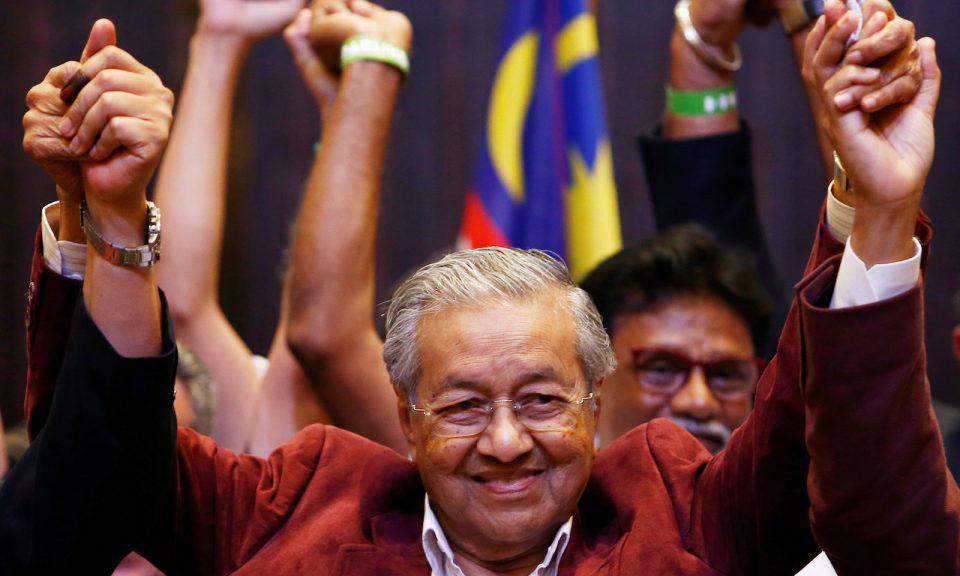Australia/Israel Review
Asia Watch: Back to the future
Jun 6, 2018 | Michael Shannon

“A new era has dawned for Malaysian politics.” Such is the flavour of the commentary greeting the shock election defeat of the Barisan Nasional (BN) coalition after 61 years of uninterrupted rule. But it is too early to tell how deeply things will change as the familiar figures of Dr. Mahathir Mohammed and (soon) Anwar Ibrahim return to leadership under the banner of reform and rejuvenation.
It is certainly remarkable that in spite of the deeply embedded institutional advantages held by the BN coalition – blatant gerrymandering, a dominance of the media and a compliant judiciary – the Pakatan Harapan (Alliance of Hope) opposition pact was able to capitalise on the widespread disgust at the scandal-plagued rule of Najib Razak.
An unlikely coalition of former rivals and adversaries who set differences aside to overturn the seemingly immoveable ruling coalition, the Pakatan Harapan is made up of Anwar’s reform-oriented People’s Justice Party (PKR); the ethnic Chinese-dominated Democratic Action Party (DAP); the moderate offshoot of the Islamist PAS party, Amanah; the Sabah-based Warisan; and Mahathir’s Malay-oriented Parti Pribumi Bersatu Malaysia.
The task of reform is huge, coming after several decades of entrenched practices under what was effectively one-party rule. There are numerous thorny issues that could bring the PH coalition unstuck, but one of the more intriguing angles is the dramatic personal history between the main protagonists, who have been both political allies and bitter rivals at different intervals of Malaysia’s history.
Anwar, 70, who was Mahathir’s deputy premier from 1993 to 1998, was tipped to be his successor before being sacked and jailed on sodomy charges (which were later dropped). Malaysian politics has now come full circle, with Anwar once again expected to succeed Mahathir, 92, who plans to step down after serving one to two years in office.
During their years of bitter rivalry, one of the many ways Mahathir and Anwar clashed was over alleged links to Jews and/or Israel – a widely used trope invoked to either smear political opponents or play to the prejudices of the Malay heartland. Blaming Jews for all manner of machinations, crimes, and failures is a normal part of Malaysian politics, even though very few of the country’s citizens has ever met a Jew.
Arguably, no-one has contributed more to this phenomenon than one Dr. Mahathir Mohammed.
The clearest enunciation of the views that have sustained Mahathir for decades lies in his 1969 book The Malay Dilemma. It included a lengthy exposition on the differences between the races, chiefly the Chinese and the Malays, but referred also to the Jews as being “not merely hook-nosed, but they understand money instinctively”. He further noted that their “stinginess and financial wizardry gained them commercial control of Europe” and thereby provoked antisemitism.
This is the man that authorised the Malaysian Censorship Board to ban the showing of Steven Speilberg’s film Schindler’s List in 1994 (it allegedly had “the purpose of asking for sympathy for one race [Jews], as well as to tarnish another race [Germans]”); the same man who in 1986 told an international conference the Jews had become “monsters” and “apt pupils of Dr Goebbels”; and the same man who had his Government cancel a 1984 visit to Malaysia by the New York Philharmonic Orchestra because of its intended performance of a work by a Jewish composer.
In his 2003 swansong speech at the Organisation of the Islamic Conference, Mahathir asserted that while Jews and Muslims were natural enemies, “1.3 billion Muslims cannot be defeated by a few million Jews.” He also declared that, “The Europeans killed 6 million Jews out of 12 million. But today the Jews rule the world by proxy.”
Up until his rapprochement with Anwar in 2016, Mahathir repeatedly accused his rival of sympathy “towards the struggles of the Jews,” and disregarding the plight of the Palestinians. “Anwar is not confused, he is close to Israel. When he got out of prison in 2004, he met with (Paul) Wolfowitz in Munich, Germany, for three hours,” Mahathir claimed.
Anwar himself is not without form. In 2010, the then opposition leader accused the BN government of Israeli links for having engaged the services of APCO Worldwide, an international consulting firm based in Washington that allegedly advised an Israeli election campaign and had two former Israeli officials on its 50-member advisory panel.
On top of this came an allegation that contractors upgrading the communications system for the Bukit Aman police headquarters in Kuala Lumpur were in fact “Israeli intelligence” and “agents of Tel Aviv”.
“If we love our country, and we are supposedly Malay [Malaysians], then why should we sell our pride to the Israelis?” Anwar plaintively asked.
The antisemitism of Malaysian leaders has trickled down. A 2014 Anti-Defamation League (ADL) survey found that more than 60% of Malaysians exhibited antisemitic beliefs, making Malaysia the most antisemitic country surveyed in Asia, outside of the Middle East.
Tags: Antisemitism, Asia, Malaysia






